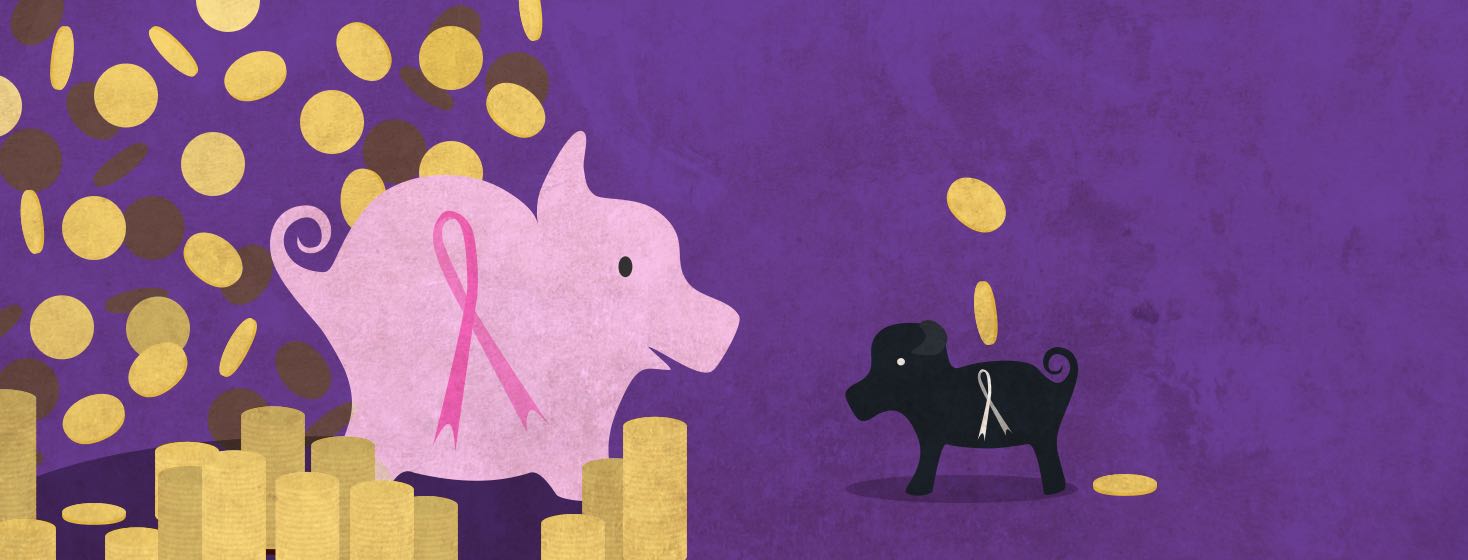Breast Envy
When I was a young girl, I was completely flat-chested. Every article of clothing I wore simply hung shapelessly. It was flat-out embarrassing. (Pun intended.)
Now, I am an old lady and -- frankly -- I could care less about the size of my breasts, which have grown by the way but only due to an overall increase in body fat. In fact, if I could make a trade, I would happily “sacrifice” all the extra fat in my body to be flat-chested again. But that’s another story... (see After Cancer Diagnosis, Exercise is More Important Now Than Ever).
Calling out the disparity
As a lung cancer survivor and advocate, I now deal with a different type of breast envy: breast cancer research funding.
Listen, I understand that all cancer is bad. People die and suffer from every type of cancer. I certainly harbor no ill will toward the breast cancer community. On the contrary, I have empathy for them.
I see the awareness, funding, and compassion for breast cancer. Meanwhile, nearly twice as many women die from lung cancer.
Who rallies around cancer awareness?
Most people don’t choose to become cancer advocates until it touches their life or someone they care about. One of the reasons breast cancer research is so well endowed is due to that cancer’s high survival rate of 90 percent. That leaves a lot of long-term survivors to rally around the cause. Meanwhile, lung cancer’s survival rate is still hovering around 18 percent. Do the math. The survival rate for breast cancer is five times more than lung cancer.
Also, breast cancer patients’ loved ones also become advocates (as well they should!), adding to the breast cancer advocacy army.
With five times the survival rate and virtually no stigma, is it any wonder breast cancer research funding surpasses lung cancer?
Discrimination and federal funding
Imagine if lung cancer had five times as many survivors storming Congress to request research dollars. (Not to mention their friends and families!) Without the stigma factor, well, the possibilities for new discoveries would be endless.
Envy is not really the right word to describe my feelings. But there is a great injustice taking place. It makes me feel like this is a different kind of discrimination, not based on race or gender, but on the type of cancer I was diagnosed with. And it IS discrimination.
It’s one thing when individuals give their own money to support research for a particular type of cancer. But the U.S. federal government is the largest funder of cancer research. That means WE the people are paying for all federal cancer research. The disparity in funding is simply not right. Lung cancer patients are being wronged by our own government.
Because breast cancer survivors and advocates outnumber lung cancer survivors by so many, that means lung cancer survivors and advocates must work twice as hard -- or rather five times as hard -- to have an equal voice.
It's time for a change
I have written about this issue previously and likely will again. One day we will be treated fairly. How many people will need to die before that happens?
In the meantime, please connect with advocates and organizations leading the charge to increase federal research funding. Get familiar with the facts and contact your congressman/woman and ask why lung cancer patients continue to be robbed.
Yes, all cancer is bad. But until the federal government gets serious about the number one cancer killer -- and takes us seriously -- nothing will change.
No, I no longer give a rat’s butt about my breasts. I very much care about people fighting for their next breath -- past, present and in the future.

Join the conversation